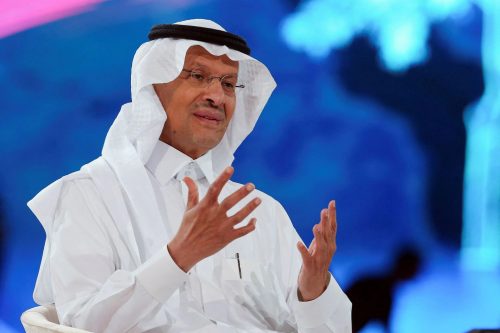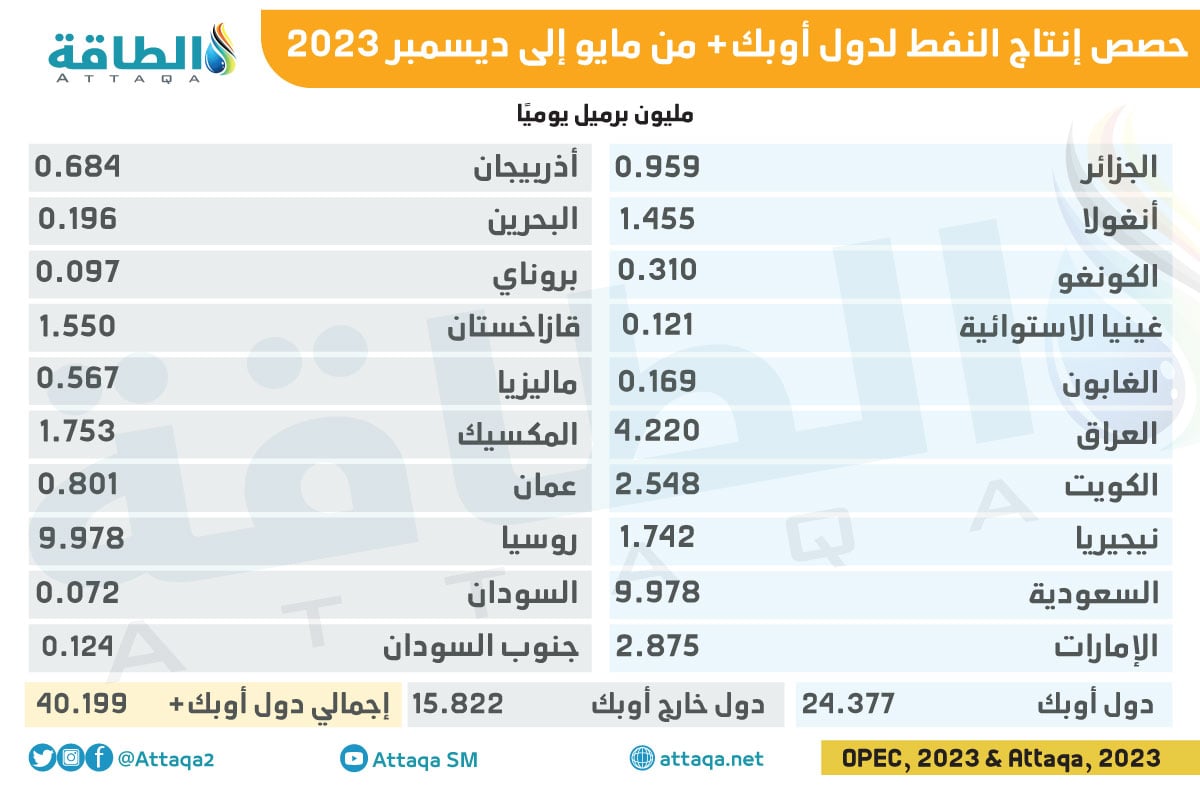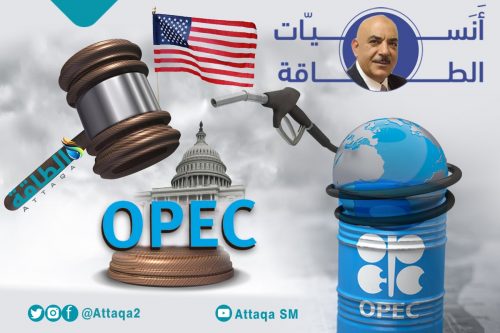OAPEC Secretary General, Engineer Jamal Issa Al-Loughani, warned of new risks facing the global oil market, which is witnessing uncertainty after the re-introduction of the “No OPEC” bill.
Today, Monday, April 3 (2023), the Secretary-General of the Organization of Arab Petroleum Exporting Countries (OAPEC) stated that some US senators are trying to put pressure on OPEC, to push it to back down from the recent decision of the OPEC + coalition regarding reducing total crude oil production from The target production level for the month of August (2022) is 2 million barrels per day, according to what was stated in the organization’s statement, of which the energy platform obtained a copy.
The Secretary-General of OAPEC said that some senators reintroduced, on March 8, the law aimed at introducing amendments to the US anti-monopoly law, by canceling the immunity of OPEC and oil companies in its countries, and enabling them to be judicially held accountable, while allowing the US Department of Justice imposing antitrust fees for illegal pricing practices.
Ignore world events
Engineer Jamal Al-Loughani says that supporters of the No-OPEC bill claim that the organization wants to set global oil prices, which has resulted in higher prices for consumers around the world.
Al-Loughani pointed out that they did not pay attention to several issues, the first of which was the global wave of inflation that prompted central banks to raise interest rates, amid fears of a recession in the performance of the global economy.
The second matter, according to the OAPEC Secretary General, is the direct intervention in the pricing mechanisms in the oil market on the part of the Group of Seven, the European Union and Australia, by imposing a price ceiling on Russian oil exports and oil derivatives transported by sea, according to a statement that the energy platform obtained a copy of.

He added, “The supporters of the No OPEC bill did not notice that its approval would result in the inability of oil supplies to meet market demand in the future, especially with the presence of several factors, the first of which is the limited surplus production capacity due to the lack of investment in the oil sector, resulting from attempts to dispense with fuel.” fossil”.
He continued, “The second factor is the decline in strategic oil stocks to critically low levels, against the backdrop of their use by IEA member states during the past year 2022 as a tool to influence the oil market balances after the war in Ukraine.”
OAPEC Secretary General explained that the last factor is the repercussions of the Russian-Ukrainian crisis and its impact on Russian oil production, especially with Moscow’s recent decision to reduce its production by 500,000 barrels per day, in response to the embargo imposed on its oil exports.
Repeatedly waving the law of no OPEC
The Secretary-General of OAPEC, Eng. Jamal Al-Loughani, pointed to the repeated use of the “No OPEC” law, as previous versions of the bill had previously failed, the latest of which was its approval by the US Senate Judiciary Committee on May 5, 2022, but it was not approved by the Senate and House of Representatives. And it did not reach the stage of approval by the US President.
He explained that the bill faces great opposition from actors in the oil industry globally, including the American Petroleum Institute, which said it would lead to an increase in production beyond market need, and then lower prices in a way that hinders US energy companies from boosting their production, and threatens energy security. in the United States.
Engineer Jamal Al-Loughani highlighted the response of the Saudi Minister of Energy, Prince Abdulaziz bin Salman bin Abdulaziz, to the attempt to revive the draft law, and to place the G7 countries a ceiling on the price of Russian oil, when he told the Energy Intelligence website that these policies add new risks and greater ambiguity to the global oil market, at a time Clarity and stability are much needed.

And the Saudi Minister of Energy had announced that these actions would exacerbate market instability and deepen its fluctuations, which negatively affects the oil industry, stressing that the OPEC + alliance is doing its best, and has succeeded in achieving high stability and transparency in the market, compared to other commodity markets, according to statements I have seen. It has a specialized power platform.
With regard to the “No OPEC” bill, Al-Loughani indicated that the Saudi Energy Minister described it as not taking into account the importance of having a reserve of production capacity and the consequences of not having this reserve on the oil market, as it weakens investments in oil production capacity, and will also lead to a decrease in global supply in the future. severely.
It is noteworthy that the Kingdom of Saudi Arabia had threatened to stop oil exports in the event of imposing a price ceiling on its supplies to global markets, but this threat was limited to countries that adopt this decision.
Prince Abdulaziz bin Salman said, in response to a question about his opinion on re-introducing the “No OPEC” bill, and about the price ceiling and the potential effects of that on the oil market, and whether a price ceiling can be applied outside its current range, that “despite the great difference between the draft law “No OPEC” and the expansion of imposing price ceilings, their potential impact on the oil market is similar.
OPEC countries and oil prices
OAPEC Secretary General, Eng. Jamal Al-Loughani, confirmed that OPEC has not set oil prices at all since the beginning of the eighties of the last century, but it has been working mainly to ensure the stability and balance of the global oil market, in cooperation and coordination with some of the main oil-producing countries from outside it within the OPEC + alliance.
He said that the organization has already succeeded in achieving this goal during the past years, during which the global oil market faced severe shocks, the latest of which was the Corona pandemic and the Russian-Ukrainian war.
The Secretary-General of OAPEC confirmed that the OPEC + alliance (which includes 6 of the OAPEC member states) has shown its willingness and ability to act in a proactive manner to support the fundamentals of the global oil market, when facing any developments and uncertain challenges.
He pointed out that the latest of these developments was the step of some OPEC + countries, in a coordinated manner, represented in voluntarily reducing their oil production, by about 1.649 million barrels per day, in addition to the agreed reduction of 2 million barrels per day, taken in October 2022.
The following infographic, prepared by the specialized energy platform, shows the production shares of OPEC + countries after Saudi Arabia and 8 oil countries cut their production from May to December 2023:

Al-Loughani explained that this latest decision is a precautionary measure to ensure the stability and balance of the global oil market, as it contributed to the rise in crude oil prices in the futures markets by about 8%, which is the largest rise in one day in nearly a year.
It is noteworthy that Anas Al-Hajji, editor-in-chief of the energy platform, explained America’s resort to the “No OPEC” law in the face of the organization’s countries, with an episode of his program “Energy humanitiesThe trial of OPEC countries and the energy crises in America and Europe.

Al-Hajji explained that there is an important clarification related to bills in the United States, which is that they turn into actual laws with the vote of the majority of Congress, then the majority of the Senate, and then the president signs it, explaining that the crisis here is that this law stipulates that passing it by a two-thirds majority in Congress and the Senate prohibits The president can use the right of veto, and then it becomes law.
However, Al-Hajji believed that passing it through the two chambers might make the law a card of pressure in the hands of US President Joe Biden on the Gulf states, especially since it was previously proposed during the era of President George Bush Jr., who put it in his desk drawer.
related topics..
Also read..

Leave a Reply